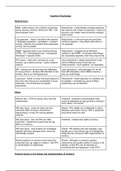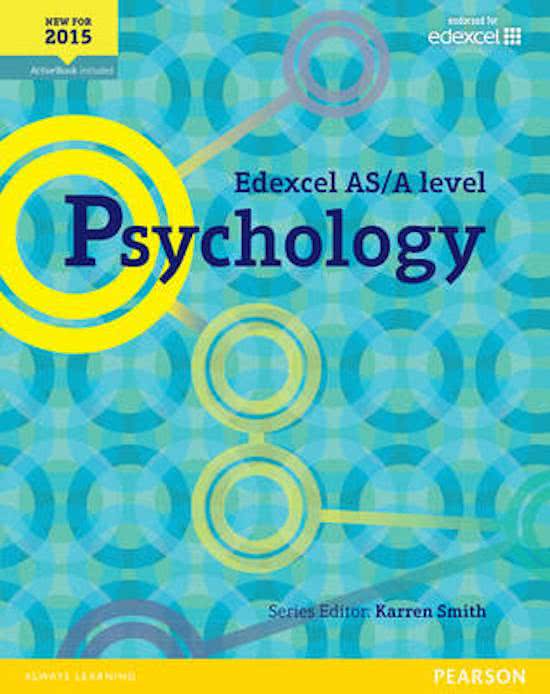Cognitive Psychology
Reductionism
MSM - splits memory into 3 distinct & separate Reductionist - model breaks complex behaviour
stores (sensory memory, STM and LTM) + info like memory into 3 basic components + does not
flows between them. discuss in any detail, interconnections between
those stores.
Cog approach - looks at functions like memory Reductionist - in the real world we use these
+ language acquisition + perception + problem- functions together + they affect each other so
solving + attention & considers them separately not separate.
so they can be studied.
WMM - separate parts to our working memory Reductionist - it fragments the diff“slave”
(STM) - CE + phonological loop + visuospatial systems in the WMM + as though these things
sketchpad + episodic buffer. are completely separate, when they may not be.
PET scans - used when carrying out a cog Less reductionist - helped researchers to see
function, eg. problem-solving + useful research that the different parts of the brain are
method. interconnected + work together, not separately.
RM - memory can be reconstructed differently Less reductionist - acknowledges ID ( we all
for every person + all have diff schemata to one have diff schemata), which affects memory +
another, due to our diff experiences. way we recall things.
Cog psych - easier to study individual aspects of Reductionist - better approach bc variables can
the mind, that may be too complicated to study be isolated + controlled so cause & effect
otherwise + not all theories are equally relationship can be identified.
reductionist.
Ethics
Memory test - if PPs do poorly, they may feel Unethical - exposed to psychological harm,
embarrassed. could be addressed by saying there’s nothing to
worry about + its normal.
HM case study - could not make any new Ethical - PPs’ details are confidential so Henry
memories after his doctor removed his Molaison was known only as “HM” in published
hippocampus, to stop him having epileptic documents about his care.
seizures.
HM case study - rare, the PPs are often Unethical - violates their rights to privacy.
examined + researched a great deal (to see
effect on memory).
HM case study - case studies can investigate Ethical - HM already had brain damage, case
patients with brain damage which cannot be studies are a more ethical way of investigating
intentionally created. things like the removal of HM’s hippocampus on
memory.
Recent research on memory more natural by Ethical - although no consent is gained,
using field exp, eg. stage an incident + ask PPs researchers are usually careful to conduct a full
to recall details of it afterwards. debrief, so that PPs can be informed of
everything that has happened + their RTW.
Practical Issues in the design and implementation of research
, Most exp are lab based - eg. Baddeley (1966b) Lacks eco val + mundane realism - learning
+ conducted in artificial setting. word lists in a lab setting does not occur in real
life + unnatural behaviour + reducing val of
results.
Lab exp - EV controlled, eg. Baddley (1966b) - Cause & effect relationship identified - between
all PPs took part in the exp 1at a time. IV (type of encoding) + DV (number of words
recalled) so high internal val.
Trigrams - used to test memory + meaningless 3 Useful - equally meaningless to every PP +
letter syllable + made of consonants, eg. XGM. person’s previous experience won't affect how
well they recall the info in the exp. //Low
construct val as it's not a true test of how we use
memory everyday.
Field exp - to study memory, eg. into EWT, this Hard to replicate - less control over EV, eg.
could take the form of a staged incident in a noise from traffic + weather + conditions not
public place. exactly the same.
Lab exp - use volunteer sampling + certain type Low pop val - sample does not represent the
of person volunteers to take part, eg. those who target pop.
have the time & interest to do so.
Recent research on memory more natural by High eco val - better than lab exp, as PPs
using field exp, eg. stage an incident + ask PPs behaviour is realistic.
to recall details of it afterwards.
Psychology as a Science
Most exp are lab based - eg. Baddeley (1966b) Lacks eco val + mundane realism - learning
+ conducted in artificial setting. word lists in a lab setting does not occur in real
life + unnatural behaviour + reducing val of
results.
Lab exp - EV controlled, eg. Baddley (1966b) - Cause & effect relationship identified - between
all PPs took part in the exp one at a time. IV (type of encoding) and DV (number of words
recalled) so high internal val.
WMM- suggests there’s separate parts to our Less scientific - abstract concept + not directly
WM, eg. CE (deals with problem-solving + testable + we do not even know if such a thing
decision making) exists + if an idea is not falsifiable, this reduces
its scientific status.
Bartlett's War of Ghost - PPs shortened their Less scientific - Bartlett gathered data in a
memory over time when they recalled it + subjective way, bc he described the nature of
changed details to fit in with their own culture. the recalled info, making it ql, unreliable.
Lab exp + testing - does make cog psych largely Less scientific - bc if not, then the findings
scientific, eg. Steyvers & Hemmer said that it wouldn't represent how we use our memory in
was more important for research to have eco va everyday life + may well not be valid + some do
than high control in an exp. not agree that this is the best way to conduct
research into topics like memory.
Field exp sometimes used - eg. S&H-Gil - 570 Generalisable to wider population, ie. children in
PPs from Madrid, aged 5-17 years gathered via other cities of Spain.





